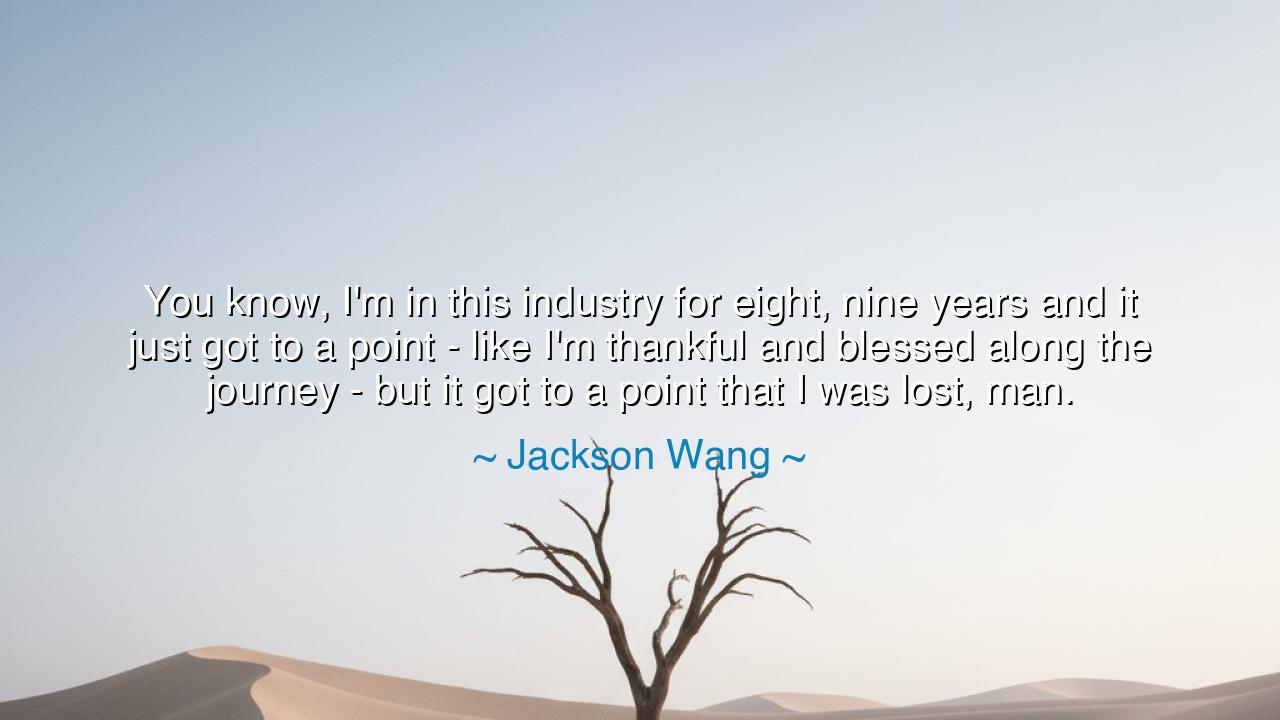
You know, I'm in this industry for eight, nine years and it just
You know, I'm in this industry for eight, nine years and it just got to a point - like I'm thankful and blessed along the journey - but it got to a point that I was lost, man.






Hear the voice of Jackson Wang, spoken with honesty and vulnerability: “You know, I’m in this industry for eight, nine years and it just got to a point—like I’m thankful and blessed along the journey—but it got to a point that I was lost, man.” This is no idle confession, but a cry from the depths of the human spirit. It reveals the paradox of success: that one may walk the road of blessings, gain achievements, and receive the applause of multitudes, yet still find themselves wandering in the wilderness of meaning. His words remind us that gratitude for external blessings does not always fill the emptiness within, and that even the brightest lights of success cast deep shadows.
The ancients knew this truth well. Kings of old, adorned in jewels and seated upon thrones of gold, would often confess in secret chambers that their souls felt hollow. The Roman emperor Marcus Aurelius, though master of an empire, wrote in his Meditations of the loneliness of power, the weariness of duty, and the struggle to keep his spirit from despair. Success, he discovered, can become a burden as heavy as failure, for without clarity of purpose the soul becomes lost no matter how far it has traveled. Jackson’s words echo this timeless struggle: the paradox of being both thankful for blessings and yet searching desperately for direction.
Consider the story of Buddha. Born as Prince Siddhartha, he possessed every blessing a man could ask for—wealth, comfort, status, and honor. Yet, though blessed, he felt lost when confronted with the suffering of the world. He could not find peace in the palace walls. His journey reminds us that blessings without purpose do not quench the thirst of the heart. It was only when he left his crown behind to seek truth that he found the path to enlightenment. So too does Jackson’s admission remind us that being thankful does not mean the soul ceases to hunger for meaning.
The words “I was lost, man” carry the weight of every traveler who has reached a crossroads where the compass of the heart fails to point true. It is not a statement of weakness, but of humanity. To confess being lost is to admit that one is searching for something greater, something beyond applause or material gain. It is a recognition that the soul was made not just for survival, not just for success, but for alignment with truth, with purpose, with authenticity.
Yet, in his confession there is also resilience. For the one who admits being lost has already begun the journey to be found. The wanderer is closer to wisdom than the one who pretends certainty while walking in circles. His gratitude—his acknowledgment of being thankful and blessed—is the anchor that prevents despair from consuming him. Though adrift, he still clings to light, and this is the beginning of renewal.
The lesson is clear. We must not measure our lives only by the number of years we have labored, nor by the applause we have gained, nor by the wealth we have gathered. These things may enrich the body but cannot alone sustain the soul. When you feel lost, pause. Reflect upon your journey, give thanks for the blessings, but also dare to ask: What is my true purpose? What flame do I carry within me that no stage, no salary, no success can replace? For only when the heart’s compass is realigned can the wanderer find the way again.
Practical wisdom follows: if you feel lost, seek silence, reflection, and truth. Step back from the noise of the industry, or the endless race of life. Write, meditate, pray, or journey into nature. Speak honestly with mentors and companions who remind you not of your fame, but of your humanity. Above all, do not fear the feeling of being lost—for it is often the prelude to being truly found.
Thus, Jackson Wang’s confession rises as a teaching for all: One may be thankful and blessed, yet still be lost without purpose. To live well is not only to count blessings but to discover the path on which they lead. Give thanks, yes—but seek meaning. Accept your lostness, for it is the first step to being found. Walk not only the journey of success, but the journey of the soul.






AAdministratorAdministrator
Welcome, honored guests. Please leave a comment, we will respond soon